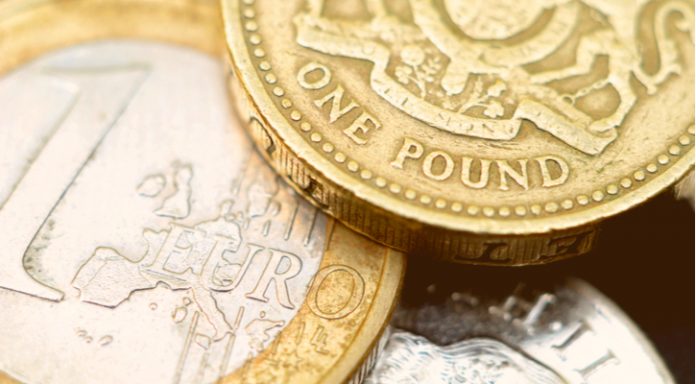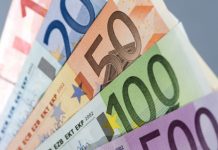The pound hit a new 11 month low of 1.1026 against the euro during Tuesday’s trading, as Prime Minister Theresa May shrugged off fears of a no-deal Brexit. Analysts are now split as to where the market is likely to move from here, with some suggesting that the GBP/EUR rate has now bottomed out.
| What do these figures mean? |
|---|
| When measuring the value of a pair of currencies, one set equals 1 unit and the other shows the current equivalent. As the market moves, the amount will vary from minute to minute.h If the euro amount increases in this pairing, it’s positive for the pound. Or, if you were looking at it the other way around:1 EUR = 0.87271 GBPIn this example, €1 is equivalent to approximately £0.87. This measures the euro’s worth versus the British pound. If the sterling number gets larger, it’s good news for the euro. |
This week had been widely forecast to see 2018’s worst sterling rate against the euro so far, and it has delivered on expectations.
Monday saw an 11 month low, which was then surpassed by Tuesday’s trading session. Sterling is suffering as investors come to terms with the increasing chance of a no-deal Brexit. The UK government released preparatory notes on this eventuality on Thursday last week, and the markets have since been digesting this. On Tuesday, Theresa May announced that the UK had secured its first post-Brexit trade deal as part of a visit to Africa – but this seems to have done little to calm investors who are concerned by both the economic and political instability caused by Brexit.
| How does political risk have impact on a currency? |
|---|
| Political risk drags on the confidence of consumers and businesses alike, which means both corporations and regular households are then less inclined to spend money. The drop in spending, in turn, slows the economy. Foreign investors prefer to invest their money in politically stable countries as well as those with strong economies. Signs that a country is politically or economically less stable will result in foreign investors pulling their money out of the country. This means selling out of the local currency, which then increases its supply and, in turn, devalues the money. |
Investors will be looking for further Brexit news and reactions from both the UK and Europe on Wednesday. As the chances of a no-deal Brexit increase by the day, this is likely to be the focus of the markets for the time being. Negotiations are now ongoing, as both sides scramble to meet an October deadline, meaning further developments could happen at any time. However, some 20% of analysts, asked during July, said that they anticipated a no-deal result from the Brexit negotiations – and this was predicted to cause an 8% crash in the value of sterling. With sentiment like this, Theresa May’s government have a way to go to settle markets worried about the possibility of a hard- or no-deal Brexit.
| Why is a “soft” Brexit better for sterling than a “hard” Brexit? |
|---|
| A soft Brexit implies anything less than UK’s complete withdrawal from the EU. For example, it could mean the UK retains some form of membership to the European Union single market in exchange for some free movement of people, i.e. immigration. This is considered more positive than a “hard” Brexit, which is a full severance from the EU. The reason “soft” is considered more pound-friendly is because the economic impact would be lower. If there is less negative impact on the economy, foreign investors will continue to invest in the UK. As investment requires local currency, this increased demand for the pound then boosts its value. |
On the continent, European investors have remained unmoved by recent data releases, leaving analysts to anticipate that this week’s upcoming batch of performance statistics will have a limited impact on the price of the euro. Today sees the release of German GfK Consumer Confidence data, and French GDP information, with German unemployment figures due out tomorrow. With all these stats expected to come in fairly flat, analysts expect that they are unlikely to prompt large market movements, although with sensitive markets and multiple moving parts, especially strong economic data coming out of Europe could always boost investor confidence and improve the price of the euro.
| Why does strong economic data boost a country’s currency? |
|---|
| Solid economic indicators point to a strong economy. Strong economies have strong currencies because institutions look to invest in countries where growth prospects are high. These institutions require local currency to invest in the country, thus increasing demand and pushing up the money’s worth. So, when a country or region has good economic news, the value of the currency tends to rise. |
For investors both in the UK and beyond, Brexit announcements, and industry reaction, is key. Until something definitive comes from negotiations, all eyes will be on the talks, as investors gauge the likely impact of Brexit on the short – and long-term – health of the UK and European economies. This is likely to mean the rocky ride for the GBP/EUR exchange rate continues for some time to come.
This publication is provided for general information purposes only and is not intended to cover every aspect of the topics with which it deals. It is not intended to amount to advice on which you should rely. You must obtain professional or specialist advice before taking, or refraining from, any action on the basis of the content in this publication. The information in this publication does not constitute legal, tax or other professional advice from TransferWise Inc., Currency Live or its affiliates. Prior results do not guarantee a similar outcome. We make no representations, warranties or guarantees, whether express or implied, that the content in the publication is accurate, complete or up to date. Consult our risk warning page for more details.
This article was initially published on TransferWise.com from the same author. The content at Currency Live is the sole opinion of the authors and in no way reflects the views of TransferWise Inc.





